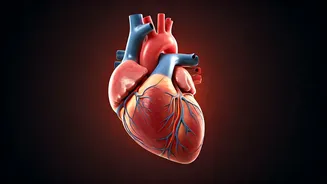Dietary Modifications for Heart
Nourishing your body with heart-healthy foods is fundamental. Emphasize fruits, vegetables, and whole grains, which are packed with vitamins, minerals,
and fiber. Fiber helps reduce cholesterol levels, promoting a healthier cardiovascular system. Incorporate lean proteins like fish and poultry instead of red meat. Red meat is often high in saturated fats, which can increase the risk of heart disease. Choose healthy fats, such as those found in avocados, nuts, and olive oil, as they contribute to overall heart health. Limit processed foods, sugary drinks, and excessive salt intake. Processed foods tend to be high in sodium, which can elevate blood pressure. Excessive sugar intake can lead to weight gain and increase the risk of diabetes, a major risk factor for heart disease. Staying hydrated by drinking plenty of water each day also supports cardiovascular function. Following these dietary modifications can significantly reduce the risk of heart-related ailments and improve overall health and vitality.
Embrace Regular Physical Activity
Regular physical activity is another cornerstone of heart health. Aim for at least 150 minutes of moderate-intensity exercise per week, such as brisk walking or cycling. This level of activity helps lower blood pressure, improve cholesterol levels, and maintain a healthy weight. Incorporate a mix of aerobic and strength training exercises. Aerobic exercises, like jogging and swimming, improve cardiovascular endurance. Strength training builds muscle mass and boosts metabolism, which can help burn more calories and support weight management. Find activities you enjoy to stay motivated. Whether it's dancing, hiking, or team sports, selecting activities you find pleasurable makes it more likely that you'll stick to your fitness routine. Gradually increase the intensity and duration of your workouts to continuously challenge your cardiovascular system. Start slowly and gradually increase the amount of physical activity. Remember to listen to your body and take rest days when needed to prevent injuries and allow for recovery. Consistent exercise habits contribute to significant improvements in heart health and overall physical fitness.
Manage Stress Effectively
Chronic stress can negatively impact heart health. Find healthy ways to manage stress levels. Techniques like deep breathing, meditation, and yoga can help calm the mind and reduce stress hormones. Regular practice of these techniques can significantly reduce your stress response. Prioritize relaxation and take breaks throughout the day. Set aside time each day for activities you enjoy, such as reading, listening to music, or spending time in nature. Ensuring enough sleep is essential. Aim for 7–8 hours of quality sleep each night. Lack of sleep can increase stress levels and disrupt bodily functions. Maintain a balanced lifestyle with a good work-life balance, allowing you time to pursue personal interests and build supportive relationships. If stress becomes overwhelming, consider seeking support from a therapist or counselor. They can offer guidance and tools to manage stress effectively. Effective stress management will support a healthy heart.
Monitor Blood Pressure Regularly
Regularly monitoring your blood pressure is key to preventing heart problems. High blood pressure, or hypertension, is a significant risk factor for heart disease. Get your blood pressure checked regularly by a healthcare professional, even if you feel fine. This will help detect any potential issues early. Maintain a record of your blood pressure readings and discuss them with your doctor. If you are diagnosed with high blood pressure, work with your doctor to create a plan for managing it. This plan might include lifestyle adjustments, such as diet and exercise, and/or medication. Follow the prescribed treatment plan carefully, as this is crucial for maintaining healthy blood pressure levels. Make sure to adhere to regular check-ups with your doctor to ensure that your treatment plan is effective and that your blood pressure remains within a healthy range. Consistent blood pressure monitoring allows for early intervention and improves the long-term well-being of the heart.
Quit Smoking Immediately
Smoking is one of the most detrimental habits for heart health. If you smoke, quitting is one of the best things you can do for your heart. Smoking damages blood vessels, increases blood pressure, and raises the risk of heart attack and stroke. There are various resources available to help you quit smoking. These include nicotine replacement therapy, medications, and support groups. Seek professional guidance from your doctor or a smoking cessation specialist. They can help create a personalized plan and provide support throughout the quitting process. Avoid triggers that make you want to smoke, and find healthy ways to cope with cravings, such as exercising or taking up a hobby. Surround yourself with supportive friends and family who encourage your efforts to quit. Celebrate your milestones as you progress. Quitting smoking significantly reduces the risk of heart disease and dramatically improves overall health, supporting both a longer and healthier life.




















